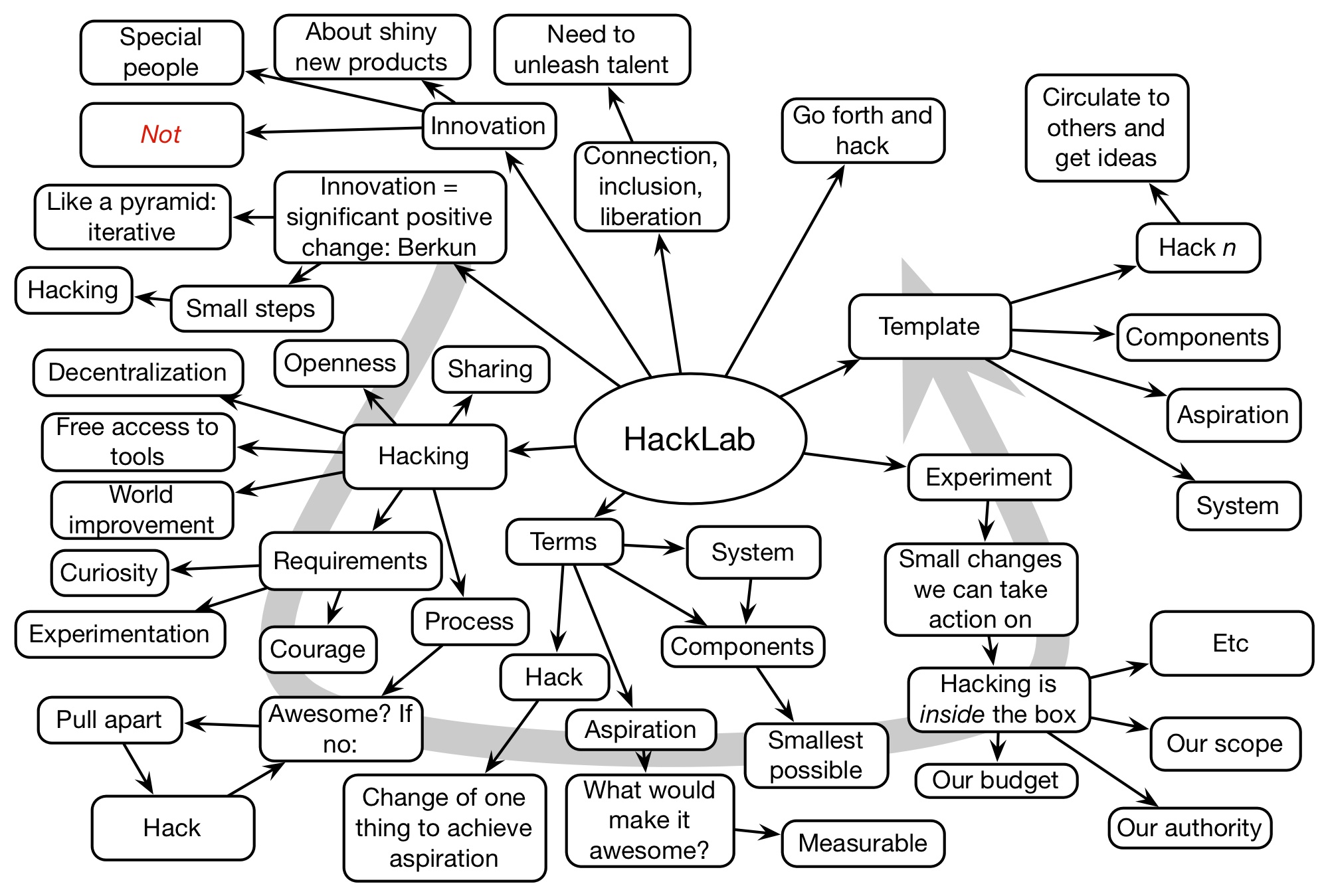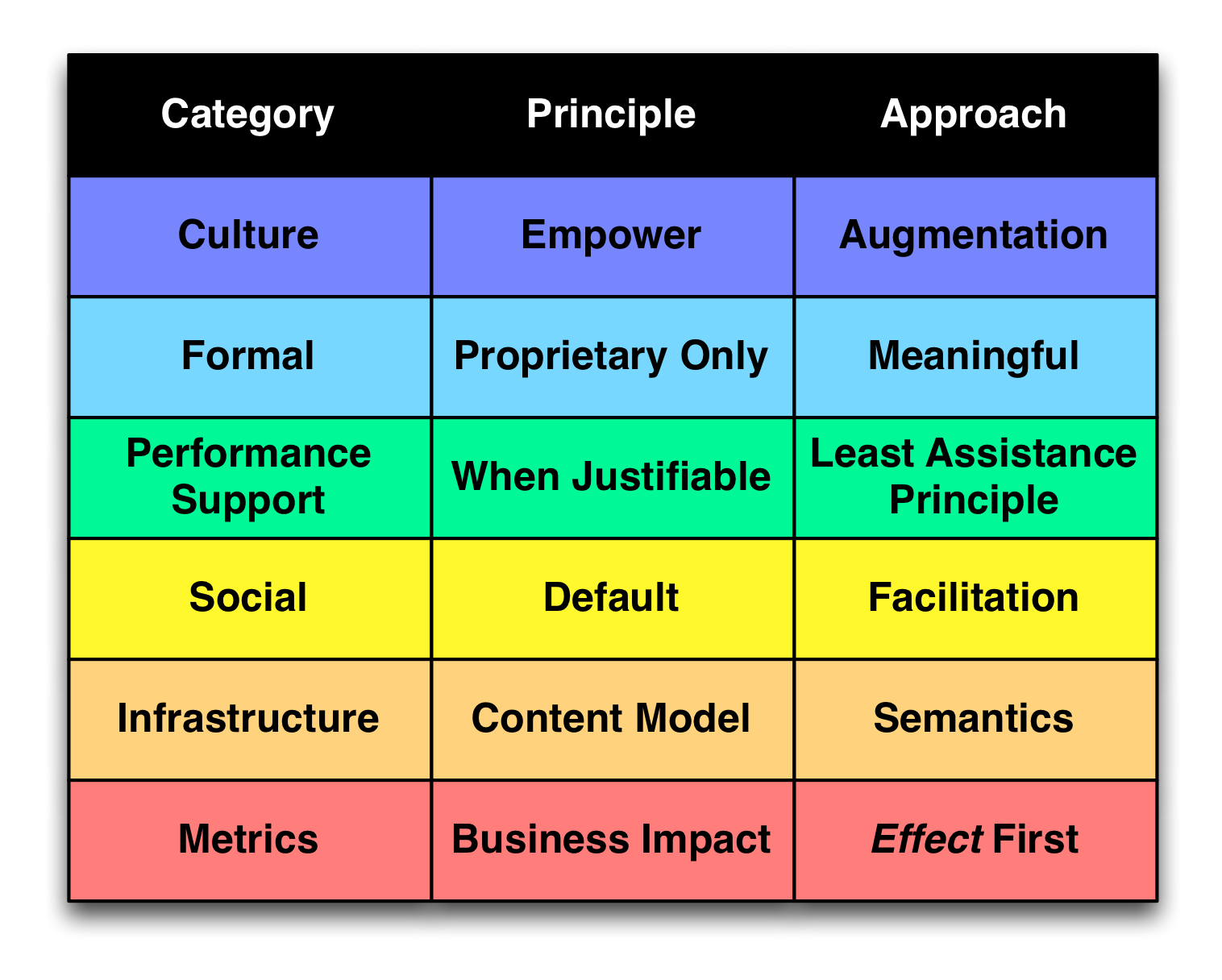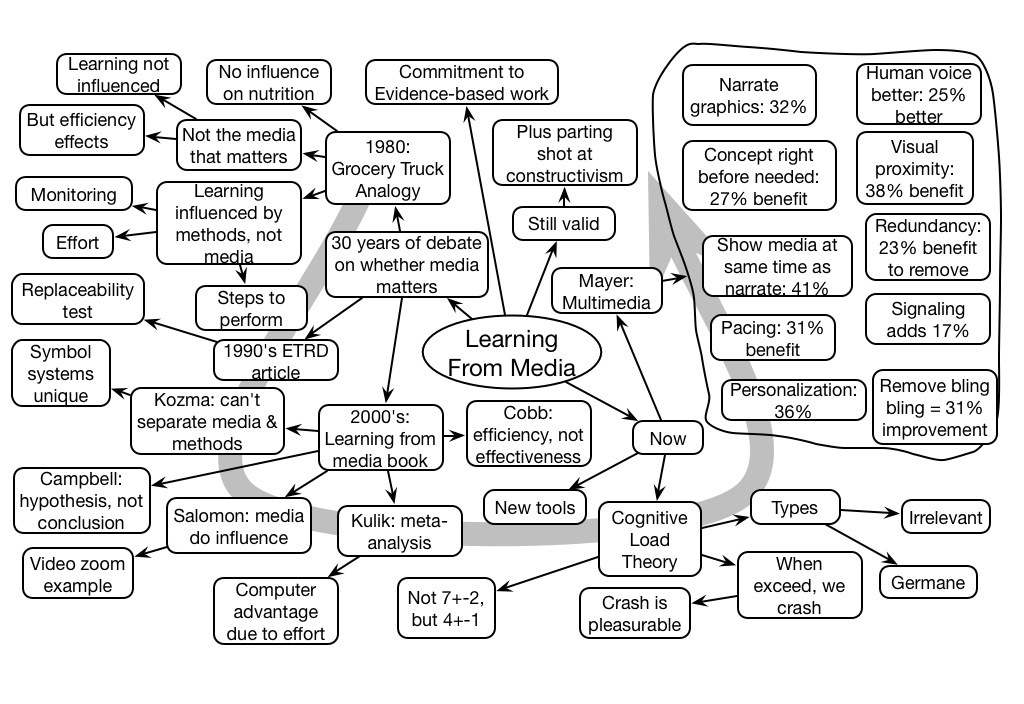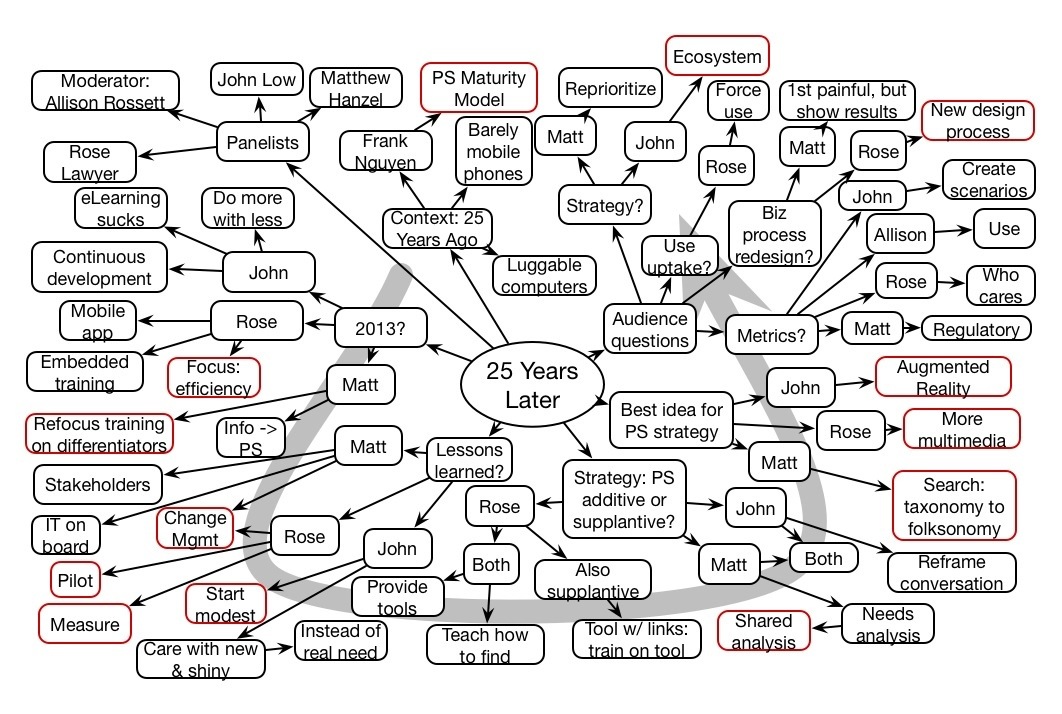Richard Clark presented the research on media and learning, highlighting the 30 years of debate. He started talking about the importance of evidence, and summarized a variety of points of view and research, with a focus on John Sweller’s Cognitive Load Theory and Dick Mayer’s multimedia work. He finished with a potshot at constructivism.
Jason Lauritsen & Joe Gerstandt #DevLearn Keynote Mindmap
Jason and Joe led a lively session inspiring us to innovate through small hacks. Their very pragmatic process is approachable and practical. A great closing to DevLearn.

Moving forward
Last week, I talked about what L&D could (and should) look like. In thinking about how to move folks forwards, I’m working on looking at various ways to characterize the different elements, and what various levels of profession should be. One of my first stabs is trying to get at the necessary core principles, and the associated approach to be taken. Here’s the thinking:
 We start with the culture of the organization. What the culture should be doing is empowering individuals, providing them with support for learning. And that is not to provide all the answers, but to support people discovering the answer. The goal is to not only address optimal execution, but increasingly to address continual innovation, which comes from cooperation and collaboration. The goal is to augment their existing capabilities with appropriate skills and tools to focus on accomplishing the work to hand. And not reintroducing things that already exist or can be found elsewhere.
We start with the culture of the organization. What the culture should be doing is empowering individuals, providing them with support for learning. And that is not to provide all the answers, but to support people discovering the answer. The goal is to not only address optimal execution, but increasingly to address continual innovation, which comes from cooperation and collaboration. The goal is to augment their existing capabilities with appropriate skills and tools to focus on accomplishing the work to hand. And not reintroducing things that already exist or can be found elsewhere.
That means that formal learning really should be focused on proprietary activities. Don’t design training on commercial tools, that exists. Save the effort to do a real course for those things that are fixed for long enough and specific to your organization. And make it meaningful: contexts that the user gets, skills that the user recognizes are needed, and that will make a real impact on the business. Done properly, with sufficient practice, it will take time and money: formal learning should be expensive, so use those precious resources where and when it really should be applied.
Performance support is more likely to add value in the moment, helping augment our limited memory and working memory capacity. When people need to be focused on the task, designing or curating resources to be used in the moment is a more cost-effective option, though again to be used appropriately. If things are changing too fast, or the situation’s unique, there are better options. And when you are developing or sourcing support, realize that less is more. Look to be minimalist, and your performers (and the bottom line) will thank you.
If things are changing too fast, or the situation’s new and unique (which will be happening more often), the network is likely to be your best resource and likely should be your first. The role here is to make sure that the network is available and vibrant. Facilitation of dialog, and skills, will make this solution the most powerful one in a company that intends to thrive.
The infrastructure, beyond the usual integration of tools, needs to take another level down, and start treating content as an asset that drives outcomes. The steps that matter are to get detailed about the content structures, the model, underneath, and the associated governance. At the end, it requires a focus on semantics, what labels we have and how we define and describe content to move forward into personalization and contextualization.
Finally, we need to measure what we’re doing, and we have to stop doing it on efficiencies. How much it costs us per seat hour doesn’t matter if that time in the seat isn’t achieving anything. We need to be measuring real business effects: are we increasing sales, decreasing costs or errors, solving problems faster, decreasing time to market, increasing customer satisfaction, the list goes on. Then, and only then, should we be worrying about efficiencies. Yes, we should be smart about our investments, but all the efficiency in the world about doing something inane is just kind of silly.
So, does this make sense? Any tuning or clarification needed? Feedback welcome.
Myths some teachers (apparently) believe
Ok, that’s an alarmist title, because it’s only a few teachers, but these are some of the ones teaching my kids, and it’s mind-numbing. These are either things I heard myself at Back to School Night, or through my kids. And they’re just crazy!
So, what am I talking about? Let me elaborate:
So, one says that the way to learn science is to learn the formulas. Um, no. If you learn the formulas doesn’t mean you actually can solve problems. You need to solve problems with them! And, frankly, I don’t care if you memorize the formulas, if you look it up it’s just fine. But this is leading to a focus on rote memorization, not meaningful learning.
The same teacher also says that learning is individual, that students shouldn’t spend their time copying off the one person who does the work. What a horrible belief in kids! Yes, they might do it, but there are plenty of ways to structure the process so that learners have to contribute. And there are substantial cognitive benefits from learners working together.
This teacher did tout the success of her students on tests. Standard, abstract, rote problems unlike kids will actually face. Yes, the system is currently structured to reward that outcome, but it’s not what I want, nor what we should value. The fact that she believes standard test results means much of anything isn’t really helpful.
A second teacher seems to believe examples aren’t useful. This teacher is presenting the concepts in class, and then assign practice at home. What’s missing are meaningful examples of applying the concepts to problems. Um, examples help. The kids aren’t seeing the concepts mapped to concepts, nor the underlying thinking that makes examples useful! And can we say ‘flipped classroom’?
To compound the problem, the kids are supposed to have access to the corrected assignments, but the answers are being posted after 9PM at nite or later, when there’s a quiz the next day! This isn’t sufficient feedback to support comprehension and performance! Apparently this teacher isn’t convinced of the value of timely feedback.
Finally, I found out one of my kids was working this weekend on a coloring project. The teacher apparently is laboring under a delusion that in coloring in some diagram or map, the learner will internalize the spatial relationships and map those to the underlying conceptual relationships. But it’s a pretty low chance, and we have far better exercises to achieve that goal. My suspicion, of course, is that this is to have pretty room when parents visit, but if so, I think the teacher bloody well ought to buy decorations, and not keep my child from enjoying the weekend to make the teacher’s room pretty.
I really wish teachers had to read, understand, and apply cognitive apprenticeship. It, to me, is essentially the best model for guiding teaching. What I’m seeing is violating all sorts of basic learning principles.
Ok, let’s be fair, this is 3 out of 10 or so teachers, but they’re my kids, and it’s too many for any other kids, too. And I did contact the principal via email with all but the last, and he was kind enough to call me, but the end result is that nothing is going to change because there’s nothing really that can be done. There are teachers who care, and some who are doing great jobs, it’s just that for such a critical job of preparing the future, we really should be doing better. So, am I overreacting?
Busy at #DevLearn 13!
Just looked at my commitments for the eLearning Guild’s always fun DevLearn conference, and I’m quite booked, all with fun and interesting stuff:
- My mobile design workshop kicks off: how do you take advantage of these devices?
- I’m doing two stages:
- a panel on the future on the mobile stage,
- talking ‘smart content’ on the emerging tech stage
- I’m doing a session on L&D myths with Chad Udell
- I’m part of a panel on the future of elearning
- and I’m doing two Morning Buzz sessions:
- one on content models & architectures,
- and one on elearning strategy
It’s going to be busy and fun. In between I will attend sessions, walk the expo, attend the DemoFest, do #lrnchat, and talk to folks. I hope one of the folks I talk to is you! If you’re there, say hello. If not, stay tuned to the backchannel, it’s a great conference (I’ll try to post mind maps of the keynotes as usual).
Making Sparks Fly
Last night I did a presentation for the San Diego chapter of ISPI titled ‘making sparks fly’. I used that concept to talk about a couple of my favorite topics: deeper instructional design, and social learning.
In the former, it’s about two things: getting the real cognitive underpinning right, and the emotional content, both integrated in a natural and elegant way. So you start with your objectives (at a high enough level, addressing real business needs). Then you immediately develop deep practice with core decisions embedded in meaningful contexts. You need sufficient practice to not get it wrong, as opposed to just getting it right. Then we elaborate with model-based concepts and story-based examples. All introduced in ways that engage the emotions as well as the mind, and closing that process off similarly addressing the emotional as well as the cognitive. The point being, if you’re going to do formal, do it right.
From there, I segued off to talk about social: the power of the additional processing you get from social learning. This includes sharing ideas, and collaborative work. Then, systematically looking at tools like blogs, wikis, profiles, feeds, and more for both formal and informal learning. The notion is that thinking and working ‘out loud’ are, in the right culture, better than not.
Formal learning (and I didn’t discuss performance support, after all it was ISPI :) addresses the optimal execution that will be just be the cost of entry going forward, while continual innovation requires the creative friction, the interpersonal interaction that generates new ideas. You need to have good learning and good performance support on those processes you can identify, but then you need to create the environment where folks are helping one another solve the new problems that arise, including new ideas. Engaging the learner, and the interaction, are both sparks to take what we do to the next level.
There’s more: culture, mindset, L&D role, and we touched on that, but in the broader picture, you want to start with social and performance support, only doing formal when you absolutely have to (as it’s dear). We need to stop doing formal only, and badly. We need to cover the spread, and do all well. Or else…
The ‘Role’ of Compliance
I’m not an expert on compliance training. I haven’t suffered through it, and I haven’t been asked to design it. But I know it’s a monkey on the back of the industry, and I know we have to address it. So how? I think there are two main barriers.
The first is the regulatory aspect. Much like I really think the problem holding back better for-profit schools is that the accreditation process isn’t informed enough about pedagogy, I think the agencies that oversee required learning don’t really focus on the right thing. When you are mandating the requirement by seat time, you’re missing the point. Really, you should have competencies associated with objectives. Compliance decoupled from outcomes is just a legal bulwark, not a meaningful prevention of behavior.
Of course, we could be spending that time doing more than a knowledge dump. I think there are two parts: helping people define the situation, and then providing them with skills to address it. Whether it’s ethics, harassment, or some other topic, if you’re just raising awareness you’re not equipping people, and if you’re just providing responses, you’re not helping them understand when it makes sense.
I’ve previously addressed the awareness issue, when I talked about shades of grey. The point being that seldom are things black and white, and the best way to help learners understand the situation is to give them scenarios and discuss in groups whether and how a situation qualifies. Having this done in groups, and then having a reflection session facilitated by an expert on the topic would really help learners get value. Even online, having them share their initial thoughts, and then see some other discussion would be valuable to get some of the benefits of social interaction.
So then the question becomes one of how to equip the learners to deal with the situations. There are always mandated policies, but they’re not always as easy to apply as suggested. First of all, I think role-plays make great sense here. You can use scenario tools for asynchronous situations, or just traditional role-play in the classroom. What’s important is that you consider these processes with problematic examples. So, for example, trying to do behavior coaching with a passive-aggressive individual. You might have someone who’s facing such a problem role play the tough individual to deal with, and another member of the class can try to apply the principles. Again, you’re venturing out into the grey that acknowledges it’s never as clear cut and easy as it seems.
Of course, the latter pedagogies don’t guarantee anything (learning is probabilistic, after all), and you’ve still the barrier that there’s little real reason to care given the current way the requirements are structured, but at least you have the opportunity to make the process less onerous for the learner and have a greater likelihood of actually accomplishing something meaningful in the workplace. Someone familiar with compliance want to weigh in on how I’m off-base?
#PSS13 Opening Panel Mindmap
The opening session for the eLearning Guild’s Performance Support Symposium was an insightful panel moderated by Allison Rossett, with panelists Rose Lawyer of Huntington, John Low of Carney, and Matthew Henzel of American Express on their experiences with performance support (PS) initiatives. Interesting points included taking a holistic perspective, emphasizing change management, and future directions. I note that in some cases my interpretation is not their words :).
Content or experience
I continue to have a problem with the term content as a component of what our field does. I think there are potential problems with the label, so let me make them clear.
What we do is create content. In elearning, we create introductions and concept presentations, we portray examples, and we make interactivities that provide practice. Even in F2F training, we have content and structure around actions we ask our learners to take. At the end of the day, much of what we’re working on is content that is communicated or triggered by learner actions.
However, I think there’s a problem with thinking of it that way. I believe we need to focus on the activity, not on the content. What’s important is the learner’s experience that is created by sequencing content and learner actions, not the content itself. You could present content in different ways (for instance, labeled slides, narrated slideshow, or video) and it’s be semantically equivalent (and please don’t bring up Clark & Kozma), at least for our purposes here.
The problem is that if we focus on content, it becomes too easy to think that content presentation is equivalent to learning. Even if we test knowledge of the content afterwards, it’s not going to lead to meaningful outcomes. Thinking about producing content makes it easy to go astray.
The alternative, however, is still uncertain. Technologically, it makes sense to talk about content management systems, but learning management systems above that is the wrong language. While ‘course management systems’ addresses the real function of such systems, ideally we’d instead be thinking about ‘experience management systems’. Except I don’t think we really have those right now. You might say that trainers or mentors or coaches are that, and I might agree in the latter sense, certainly, though I’m looking for a better branding for the technology infrastructure.
There’s now an Experience API that provides some infrastructure for creating such an experience management system, but there’re still some intermediate steps needed. Fingers crossed.
Ok, so I’m thinking out loud about our language and what the implications are, but I’m a big fan of reflection and I think it’s useful to stop once in a while and think about where we’re at and how we’re doing. I welcome your thoughts.
Making Hard or Easy
Our brains are good at certain things, and not so good at others. We’re good pattern-matchers and meaning-makers, but not so good at doing things by rote. We make mistakes, almost by necessity (evolutionary advantage: if you do something a little different by chance and it’s better, it can get rewarded and more likely). And we simplify the world, partly to save energy for what we care about, but also because complexity is taxing.
And, in general, this is good. Our simplifications help us cope, make us more effective. However, given our nature, at times this can fail us. We may think we’ve taken a necessary step when we haven’t. Henry Petroski, in To Engineer is Human, helps us understand that we continue to push boundaries and take consequent risks. Atul Gawande, in The Checklist Manifesto, helps us understand the usefulness of support if we’re not going to make mistakes.
But sometimes this expediency can mask complexities and lead us astray. For a simple example, the term ‘learning management system’ can actually lead us to believe we’re achieving learning, instead of courses. And just because you have a course doesn’t mean something was learned.
There are many ways we can mislead ourselves. We can talk about a concept that we all realize has to be true, that learners differ, and then believe we can identify how someone learns. We may eventually be able to do so, but existing instruments aren’t valid, and learners change in different contexts. Plus, if we label learners as X or Y, we may limit them. When I humorously compared the ‘generational differences’ argument to age discrimination, someone deeply involved in that field corrected me that real age discrimination is a serious problem not to be taken lightly!
It may seem like an ‘angels dancing on the head of a pin‘ type of argument, but we have to be careful of the words we use and their import. We have to carefully consider the ways in which phrases can be used, or misused, and perhaps structure our use of language appropriately. It’s branding, and perhaps we need to treat it as such. At least, be careful of what terms you use and what inferences you’re making easy and which you might be inadvertently making hard.

